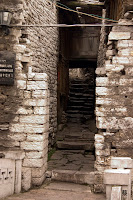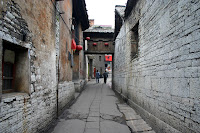
A rare quiet moment in Tianlong Tunbao Ancient Town on the day that I was there.
Now that I've actually started my entries on Sichuan, I feel kind of bad that I've not yet finished my Guizhou entries. =) So since this is a long weekend and I have a little time, I thought I'll add another entry and work towards finishing the account of my visit to Guizhou.
I made a mistake in "entry 19", we didn't visit an old Qing town after our visit to Guanyin Dong. The place I visited is Tianlong Tunbao Ancient City (天龙屯堡古镇). This town is 72km from Guiyang and part of Guizhou's Pingba County. The town used to have strategic importance as it used serve as a passageway to Yunnan and was part of what was called "the throat of Yunnan".
While several Chinese dynasties have held power over Guizhou, it was only in the Ming Dynasty (1368-1644) that Guizhou became a province proper. So in 1381, in order to strengthen the defences of the young Ming empire, dynasty founder Zhu Yuanzhang sent a general called Fu Youde and a 300,000 strong army to do battle with the Mongols, remnants of the Yuan Dynasty, who held control over Yunnan.
After defeating the Mongols and gaining control over Yunnan, General Fu Youde returned to Nanjing, the capital of the Ming Dynasty, after appointing one of his aides, Ming Yu, as governor over Yunnan. On his way back to Nanjing, General Fu Youde left parts of his army throughout Guizhou in order to stabilize and maintain Ming control over the region.







Tianlong Tunbao Ancient Town's stone buildings
These soldiers that were left behind and their families built several "tunpu" (village fortress) throughout Guizhou and the Ming village fortress that is most often visited by tourists in Guizhou is the Tianlong Tubao Ancient Village. The village is made almost entirely from stone and does look very fortress like. The descendants here are Han Chinese and still retain their traditional Ming Dynasty clothing and from what I can tell from the little farms and quite a few young children running around, it seems that they still do live here.


A few of the inhabitants of the town. The second photo is soft unfortunately. Sigh... it is one of the photos which made it painfully clear to me that I really needed to get to know my then relatively new DSLR better.
By the way, this might interest those who like history. It is said that General Fu Youde met a 10-year-old boy in Yunnan and was so impressed with his intelligence and courage that he took him. After the boy's castration, Fu Youde placed him in Prince Zhu Di's residence to serve as a eunuch. Prince Zhu Di later became Emperor Yongle, the third Ming emperor, and the boy named Ma Sanbao will grow up to be one of the most famous of all naval explorers, Zheng He.

A little plot of vegetables grow in the ancient town.
Now that I've been to an ancient town in Sichuan, I can truly appreciate the ancient towns I visited in Guizhou. Unlike, Jinli Street and Luodai Ancient Town in Sichuan, Tianlong Tunbao and the Qingyan Ancient Town, which I'll come to in a later Guizhou entry, these old towns in Guizhou still feel and look like charming old towns. Even though the Tianlong Tunbao experience wasn't as good as the Qingyan Ancient Town experience, that had more to do with the large crowd that was there the day I was there and much less to do with the town itself.
The day that I was there, a news crew from the local Guizhou TV station was there to shoot video of us. Apparently, one of the young women who works as a tour ambassador in Tianlong Tunbao Ancient Town had just won a nationwide contest and the TV station was there to shoot her at work and to do a few interviews with some of the Singaporean tourists in our group.

The camera man and the assistant of the main tour ambassador for our group during our visit.
Unfortunately for us, the poor crew and the young tour ambassador, our group of 70 was just too large and it didn't help that another large group from Guangdong was also there and soon the crowd just swelled till it was too big for the young tour ambassador and her assistant to handle. The streets were also rather narrow and there were several points of interest and it soon became impossible for the two young women to hold the attention of so many people. It was a pity as I really did want to know what they had to say but I simply couldn't keep up. I also found it hard to take photos as the large crowd and the fact that we had to keep moving to keep up with the schedule kind of put me out of the mood. Yes, yes... I'm a fusspot, I really don't like being rushed when I shoot and I can take a long time when I shoot. =)
Anyway, I'm sure the TV crew got their footage and I know they did interview several people in my tour group, so they got their story. I'm not sure if I'm the final cut on TV since I never saw that news story but it was fun nonetheless to watch the news crew at work.



The tour ambassador gives us a little introduction to Dixi and then the performance itself.
The climax of this visit to Tianlong Tunbao Ancient Town was a Dixi (also click here) aka "earth opera" performance. Dixi is considered one of the oldest operas in the world and is also considered the fore-bearer of many forms of traditional Chinese opera, including Peking Opera. Dixi is very energetic and the performance we watched, although short, included tons of fighting and was quite entertaining.


A tree grows through the roof of this house and innovative use of half a plastic bottle as a grease-catcher.
After watching the Dixi performance, we said goodbye to the news crew and the tour ambassadors and made our way to the little restaurant in Tianlong Tunbao where we had our lunch before leaving for a visit to Tiantai Mountain in the afternoon.
That's it for now. In my next entry on Guizhou, I'll talk about Tiantai Mountain and a little mishap that led to a not very exciting visit to Hongfeng Lake.
cheers
No comments:
Post a Comment